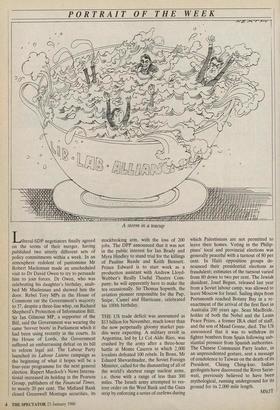PORTRAIT OF THE WEEK
A storm in a teacup Liberal-SDP negotiators finally agreed on the terms of their merger, having published two utterly different sets of policy commitments within a week. In an atmosphere redolent of pantomime Mr Robert Maclennan made an unscheduled visit to Dr David Owen to try to persuade him to join forces. Dr Owen, who was celebrating his daughter's birthday, snub- bed Mr Maclennan and showed him the door. Rebel Tory MPs in the House of Commons cut the Government's majority to 37, despite a three-line whip, on Richard Shepherd's Protection of Information Bill. Sir Ian Gilmour MP, a supporter of the Bill, said the Government was wearing the same `bower boots' in Parliament which it had been using recently in the courts. In the House of Lords, the Government suffered an embarrassing defeat on its bill to reform legal aid. The Labour Party launched its Labour Listens campaign as the beginning of what it hopes will be a four-year programme for the next general election. Rupert Murdoch's News Interna- tional increased its holding in the Pearson Group, publishers of the Financial Times, to nearly 20 per cent. The Midland Bank closed Greenwell Montagu securities, its stockbroking arm, with the loss of 200 jobs. The DPP announced that it was not in the public interest for Ian Brady and Myra Hindley to stand trial for the killings of Pauline Reade and Keith Bennett. Prince Edward is to start work as a production assistant with Andrew Lloyd- Webber's Really Useful Theatre Com- pany; he will apparently have to make the tea occasionally. Sir Thomas Sopwith, the aviation pioneer responsible for the Pup, Snipe, Camel and Hurricane, celebrated his 100th birthday.
THE US trade deficit was announced as $13 billion for November, much lower than the now perpetually gloomy market pun- dits were expecting. A military revolt in Argentina, led by Lt Col Aldo Rico, was crushed by the army after a three-hour battle at Monte Caseros in which 2,000 loyalists defeated 100 rebels. In Bonn, Mr Eduard Shevardnadze, the Soviet Foreign Minister, called for the dismantling of all of the world's shortest range nuclear arms, i.e. those with a range of less than 300 miles. The Israeli army attempted to res- tore order on the West Bank and the Gaza strip by enforcing a series of curfews during which Palestinians are not permitted to leave their homes. Voting in the Philip- pines' local and provincial elections was generally peaceful with a turnout of 80 per cent. In Haiti opposition groups de- nounced their presidential elections as fraudulent; estimates of the turnout varied from 80 down to two per cent. The Jewish dissident, Josef Begun, released last year from a Soviet labour camp, was allowed to leave Moscow for Israel. Sailing ships from Portsmouth reached Botany Bay in a re- enactment of the arrival of the first fleet in Australia 200 years ago. Sean MacBride, holder of both the Nobel and the Lenin Peace Prizes, a former IRA chief of staff, and the son of Maud Gonne, died. The US announced that it was to withdraw its fighter bombers from Spain following sub- stantial pressure from Spanish authorities. The Chinese Communist Party leader, in an unprecedented gesture, sent a message of condolence to Taiwan on the death of its President, Chiang Ching-kuo. Indian geologists have discovered the River Saras- wati, previously believed to have been mythological, running underground for its ground for its 2,000 mile length.
MStJT


























































 Previous page
Previous page